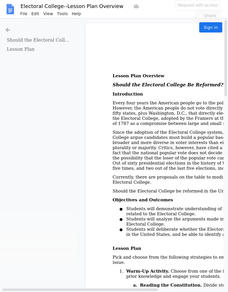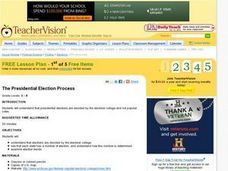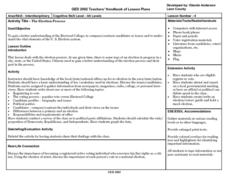C-SPAN
Electoral College Pros/Cons and Alternatives
If every vote counts, why do we need the electoral college? Middle and high schoolers study the Constitutional precedent of the electoral college, as well as its place in historical and modern elections, with an engaging social studies...
K20 LEARN
Electoral College: Does My Vote Count?
How can a candidate get the most votes, yet still lose the race for the presidency? This is has happened more than once in American history, including in the elections of 2000 and 2016. Using an activity for creating group notes, young...
C-SPAN
Electoral College
Most people are surprised to learn that American democracy is not as direct as they thought. Using a package of guiding questions, charts and curated videos, learners unpack the unique American institution of the Electoral College. The...
Encyclopedia Britannica
Electoral College Philosophical Chairs Debate
Because of the Electoral College, it is possible to win the popular vote in a US Presidential election and still lose the election. After researching the pros and cons of the Electoral College, class members engage in a structured debate...
C-SPAN
The Electoral College and the Constitution
What is the purpose of the Electoral College? Is it antiquated, or does it have a place in today's political climate? High schoolers view a series of video clips as they analyze the parts of the United States Constitution that address...
City University of New York
Electoral College
A presidential election is a lot like the 2004 World Series, and it's also a lot like choosing an orange in a paper bag. Apply the process of the electoral college to these two analogies with a set of lessons about government...
Curated OER
Tally of the 1824 Electoral College Vote
Twelfth graders study the parts of the Constitution that address presidential election. They complete a variety of activities designed to spark debate about the flaws in the Electoral College system.
Curated OER
Does My Vote Count? Teaching the Electoral College
Students comprehend the purpose, function, origin, and historical development of the electoral college. They evaluate issues of fairness and representation in the electoral process, both individually and through group discussion....
City University of New York
Presidential Elections and the Electoral College
To understand the controversy surrounding the US 2000 presidential election, class members investigate the rationale behind the Electoral Collage, the intimidation involved in the election of 1876, and the 2004 American League...
Curated OER
How the Electoral College Works
Students research the history and mechanics of the Electoral College and formulate opinions as to whether this institution should be preserved, modified or eliminated. They predict future outcomes of electoral vs. popular votes.
Mikva Challenge
The Great Electoral Race Kickoff
Do young people care about elections? Host a discussion about the role of young citizens in the electoral process with an engaging social studies instructional activity. As high schoolers read and respond to four statements about youth...
Curated OER
The Electoral College
Students examine the Electoral College's role in the election process. They conduct Internet research, and identify the elections in which the Electoral College played a deciding role.
Illustrative Mathematics
Electoral College
A cross-curricular resource that takes the electoral votes and allows your learners to organize and analyze the data. Young voters can determine which states are more influential and interpret the dotplot provided for more data....
Curated OER
Census and Apportionment
Students manage census data. In this U.S. Census lesson plan, students understand and describe the role census data play in apportionment decisions as they analyze the connection between apportionment and the Electoral College.
Heritage Foundation
The Office of the Executive
An executive is not just a leader of a company; you can also use the term to describe the president of the United States. The ninth part of a 20-part unit teaches high schoolers about the importance of the executive branch and the...
Curated OER
The Presidential Election Process
Students examine the presidential election process and discover that presidential elections are decided by the electoral college and not popular votes. They see that each state has a number of electors, and understand how this number is...
Curated OER
Elections in America
Eleventh graders examine the election process in America. For this US Government lesson, 11th graders analyze the problems with the Electoral College. Students research a specific state and create a state flash card in regards to the...
Curated OER
The Election Process
Students examine how Electoral College works, compare and contrast candidates or issues, and discuss importance of becoming registered, active voting individuals.
Curated OER
The Old Electoral College Try
Students examine defining issues in the race for the White House and evaluate important issues in several of the swing states. They create and administer a poll in their community and make predictions by analyzing the data.
Curated OER
Choose or Lose: The Electoral Process
Students examine the local and national election process. In groups, they brainstorm a list of the issues important to them and compare them to an overall list of issues present in the election. They analyze graphs and complete...
Curated OER
Decision Day
Students participate in a role play activity that emphasizes the theory behind the Electoral College. They form small groups of different sizes in order to present a candidate for class president. Finally, they use a map to determine the...
Curated OER
Presidential Campaigning
Eighth graders participate in a simulated presidential campaign by conducting research on the Internet. They define a party platform, run a campaign and write and deliver speeches in teams. Students can then act as the electoral college...
Curated OER
Let the Campaign Begin
Learners differentiate between positive and negative personal attributes and select a fictional character for nomination who personifies the qualities of a good leader. They use the Internet to learn about the election process and write...
Curated OER
Using Current Events to Understand Elections
Eleventh graders explore the the major phases of the electoral process for president. In this US Government instructional activity, 11th graders compare and contrast the delegate system of nomination and the electoral college.

























